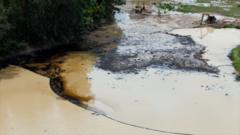Colombian energy giant Ecopetrol is under scrutiny following revelations of significant oil pollution damage linked to the company. A whistleblower, Andrés Olarte, disclosed documents indicating over 800 records of contaminated sites in Colombia from 1989 to 2018, which Ecopetrol allegedly failed to report. While the company claims compliance with environmental regulations and highlights their sustainability practices, local communities express concerns over the deteriorating condition of rivers and ecosystems due to oil leaks and spills.
Local fishermen near the company’s main refinery in Barrancabermeja, located along the Magdalena River, report noticing wildlife die-offs, with bizarre changes in fish caught, hinting at contamination. Yuly Velásquez, president of a regional fishing federation, claims to have observed significant harm to biodiversity caused by Ecopetrol's operations. Waters around the area display iridescent films indicative of oil contamination.
Olarte, who worked for Ecopetrol from 2017 until leaving in 2019, initially recognized alarming pollution data that he alleges could be hidden from environmental regulators. His disclosures include databases of so-called "unresolved environmental impacts," some of which had been neglected for over a decade. Despite Ecopetrol's assurances of an effective pollution management process and successful clean-up operations, data indicates that oil spills continue and reports of environmental incidents remain prevalent.
Citing threats to whistleblowers and environmental activists, both Olarte and Velásquez have expressed fears for their safety. Velásquez has received threats, with reports of violent incidents directed at community leaders who question Ecopetrol's practices. Despite these challenges, Velásquez emphasizes the importance of protecting fishing livelihoods against crippling pollution effects, asserting their commitment to environmentalism at great personal risk.
Colombia's complicated history of armed conflict further complicates the situation, with reports linking the private security employed by companies like Ecopetrol to potential violence against activists. While Ecopetrol dismisses allegations of involvement with illegal armed groups, concerns remain about the protection of human rights for whistleblowers advocating for environmental justice.
In the midst of these troubling circumstances, Olarte has sought to legally challenge Ecopetrol and bring attention to these environmental issues, highlighting the urgent need for accountability. Despite the economic significance of Ecopetrol, both Olarte and Velásquez remain undeterred in their fight for truth and sustainability in light of the substantial environmental threats facing their communities.
Local fishermen near the company’s main refinery in Barrancabermeja, located along the Magdalena River, report noticing wildlife die-offs, with bizarre changes in fish caught, hinting at contamination. Yuly Velásquez, president of a regional fishing federation, claims to have observed significant harm to biodiversity caused by Ecopetrol's operations. Waters around the area display iridescent films indicative of oil contamination.
Olarte, who worked for Ecopetrol from 2017 until leaving in 2019, initially recognized alarming pollution data that he alleges could be hidden from environmental regulators. His disclosures include databases of so-called "unresolved environmental impacts," some of which had been neglected for over a decade. Despite Ecopetrol's assurances of an effective pollution management process and successful clean-up operations, data indicates that oil spills continue and reports of environmental incidents remain prevalent.
Citing threats to whistleblowers and environmental activists, both Olarte and Velásquez have expressed fears for their safety. Velásquez has received threats, with reports of violent incidents directed at community leaders who question Ecopetrol's practices. Despite these challenges, Velásquez emphasizes the importance of protecting fishing livelihoods against crippling pollution effects, asserting their commitment to environmentalism at great personal risk.
Colombia's complicated history of armed conflict further complicates the situation, with reports linking the private security employed by companies like Ecopetrol to potential violence against activists. While Ecopetrol dismisses allegations of involvement with illegal armed groups, concerns remain about the protection of human rights for whistleblowers advocating for environmental justice.
In the midst of these troubling circumstances, Olarte has sought to legally challenge Ecopetrol and bring attention to these environmental issues, highlighting the urgent need for accountability. Despite the economic significance of Ecopetrol, both Olarte and Velásquez remain undeterred in their fight for truth and sustainability in light of the substantial environmental threats facing their communities.




















